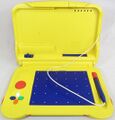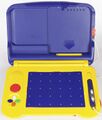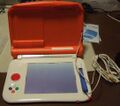Difference between revisions of "Sega Pico Models"
From Sega Retro
m (spelling/grammar/fixes, typos fixed: targetted → targeted, based of → based on) |
|||
| Line 17: | Line 17: | ||
</gallery> | </gallery> | ||
===HPC-0003A=== | ===HPC-0003A=== | ||
| − | A very rare update to the previous release by Sega/Imagineer | + | A very rare update to the previous release by Sega/Imagineer targeted at schools. This version shares its color scheme with its North American counterparts. |
<gallery> | <gallery> | ||
File:Pico JP HPC0003A 1.jpg|Console and box | File:Pico JP HPC0003A 1.jpg|Console and box | ||
| Line 96: | Line 96: | ||
===MK49325=== | ===MK49325=== | ||
| − | When [[Majesco]] were given the rights to distribute older Sega consoles in 1998, they produced this model of Pico in 1999, based | + | When [[Majesco]] were given the rights to distribute older Sega consoles in 1998, they produced this model of Pico in 1999, based on the Japanese HPC-0008. It was cheaper to manufacture, but like the [[Genesis 3]] sales were sluggish in comparison to the original release. It can be identified by the console's non-colored logo and lack of Sega branding. |
<gallery> | <gallery> | ||
File:Pico NA MK49325 1.jpg|Console closed | File:Pico NA MK49325 1.jpg|Console closed | ||
Revision as of 22:37, 12 January 2012
Thanks to its popularity in Japan, the Sega Pico went through several hardware revisions in an attempt to cut costs.
Contents
Japan
HPC-0001
Known as the Kids Computer Pico (キッズコンピュータ・ピコ), the HPC-0001 was the first model of Sega Pico in Japan, and the world for that matter. It was first released in June 1993.
HPC-0003
The HPC-0003 release was a revised version of the previous HPC-0001 version of the console, with a few minor tweaks to the bodywork that debuted in 1994. Strangely, no HPC-0002 model was released to the public.
No more DE-9 port
HPC-0003A
A very rare update to the previous release by Sega/Imagineer targeted at schools. This version shares its color scheme with its North American counterparts.
HPC-0007
1997 saw a jump to the HPC-0007, which saw a minor color change, more bodywork tweaks and a new range of software.
HPC-0008
There is very little difference between the HPC-0007 and HPC-0008, but rebranding occurred when Pico distribution rights were given to Sega Toys. The logo seen in the HPC-0007 is no longer colored.
HPC-0009
The HPC-0009, is again a very different release, with new color scheme selections, different buttons and now contains the ability to connect to the internet. This release debuted in 2001, though by this time, Pico sales were starting to slow in Japan. This version was dubbed the "Kids Communication Pico".
Pico Pocket Monsters
This 2004 Pico release was given a Pokémon makeover in an attempt to revive sales. It is otherwise identical to the HPC-0009.
Pico Anpanman
Pico Mushiking
Pico Hamtaro
- Pico JP HAM 1.jpg
Console and box
- Pico JP HAM 2.jpg
Console closed
- Pico JP HAM Box Front.jpg
Front of box
MIXT BOOK PLAYER COPERA
A 1993 release by Yamaha, this model of Pico is notable for having stereo sound output and an FM sound chip as well as a microphone and support for music composition. It is otherwise similar to the HPC-0001.
HIRAMEKI MIRAI KIDS
Someone please translate http://blogs.yahoo.co.jp/rig_veda/61101403.html kthxbye
- Pico JP HMK.jpg
Pics to probably be stoled from blog.
North America
MK49002
The MK49002 is the standard 1994 North American Sega Pico model, similar to the HPC-0007 in Japan. There are a few logo changes and the coloring is slightly different, but is otherwise identical.
MK49325
When Majesco were given the rights to distribute older Sega consoles in 1998, they produced this model of Pico in 1999, based on the Japanese HPC-0008. It was cheaper to manufacture, but like the Genesis 3 sales were sluggish in comparison to the original release. It can be identified by the console's non-colored logo and lack of Sega branding.
PAL Regions
PAL models are almost identical to their North American counterparts, but tuned to work with PAL TV setups.
South Korea
A model was also released in South Korea, likely distributed by Samsung.
| Sega Home Video Game Systems | ||||||||||||||||||||||||||||
| 83 | 84 | 85 | 86 | 87 | 88 | 89 | 90 | 91 | 92 | 93 | 94 | 95 | 96 | 97 | 98 | 99 | 00 | 01 | 02 | 03 | 04 | 05 | 06 | 07 | 08 | 09 | 10 | 11 |
|---|---|---|---|---|---|---|---|---|---|---|---|---|---|---|---|---|---|---|---|---|---|---|---|---|---|---|---|---|
| SG-1000 | SG-1000 II | Mega Drive | Mega Drive II | |||||||||||||||||||||||||
| SC-3000 | Mega-CD | Mega-CD II | Genesis 3 | |||||||||||||||||||||||||
| Sega Mark III | 32X | Dreamcast | ||||||||||||||||||||||||||
| Master System | Master System II | |||||||||||||||||||||||||||
| AI Computer | Game Gear | |||||||||||||||||||||||||||
| Saturn | ||||||||||||||||||||||||||||
| Pico | Beena | |||||||||||||||||||||||||||



































